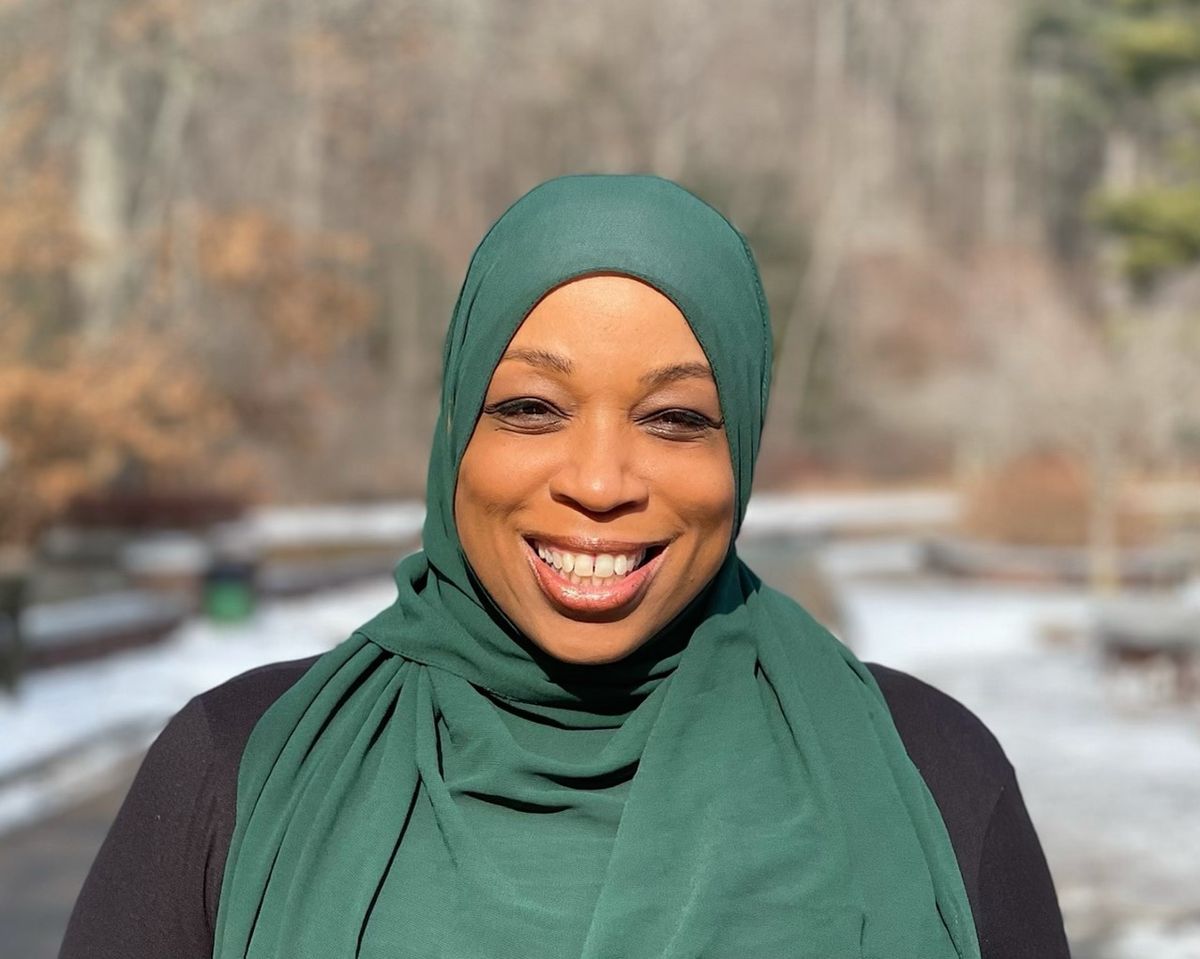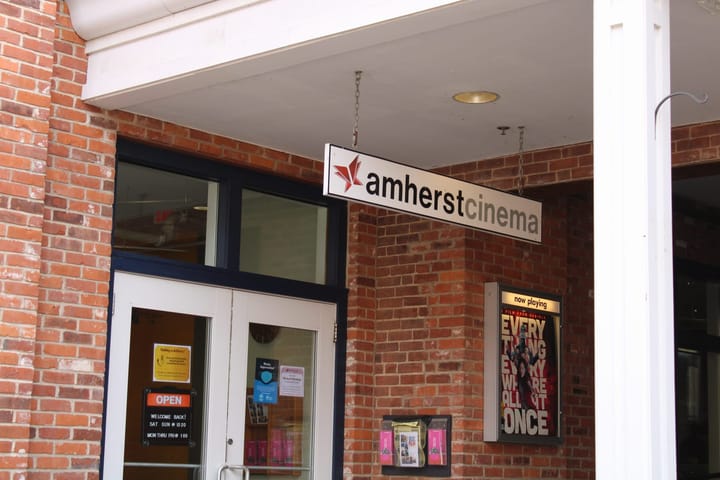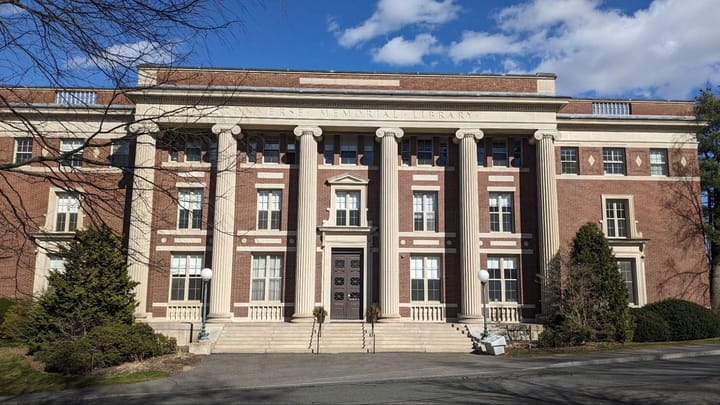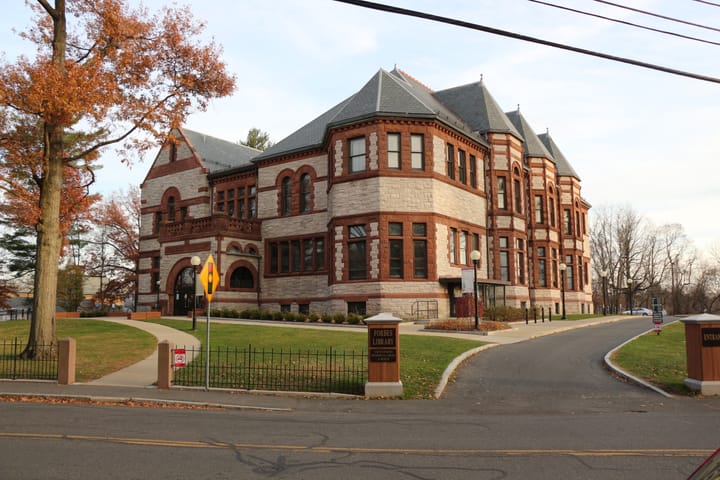Local Attorney Gives Talk on Islamophobia
The college hosted Tahirah Amatul-Wadud, executive director of the Massachusetts branch of the Council on American-Islamic Relations, for an event about Islamophobia on Tuesday, Dec. 12.

In an event titled “Responding to Islamophobia in the College Community,” the executive director and chief legal officer of the Massachusetts branch of the Council on American-Islamic Relations (CAIR), Tahirah Amatul-Wadud, spoke before an audience in Stirn Auditorium on Tuesday, Dec. 12.
The talk — co-sponsored by the Office of the President, the Center for Religious and Spiritual Life, Student Affairs, the Office of the Provost and Dean of the Faculty, and the Office of Diversity, Equity, and Inclusion — highlighted a recent spike in anti-Muslim incidents since Hamas’ Oct. 7 attacks on southern Israel.
Omar Dar, the college’s Muslim chaplain, introduced Amatul-Wadud.
Amatul-Wadud began her talk by highlighting her personal connection to her work as a Black Muslim woman.
“Everything about this moment feels deeply personal,” she said.
She explained that defending one’s own community comes with an emotional toll that is often overlooked.
“When you put people in positions, and they are part of the impacted community, they experience the issues for which they are hired and mobilized so much differently,” Amatul-Wadud said. “Maybe we’re a little sadder, maybe we move a little slower, maybe a little more emotional.”
CAIR Massachusetts has seen a dramatic increase in anti-Muslim racism, specifically hate crimes, in the past two months, according to Amatul-Wadud.
Her office has received three-and-a-half times more calls since Oct. 7 than they typically receive in an entire quarter. She emphasized that these incidents are widespread in Massachusetts, despite the perceived liberal demographic makeup of the state.
One Muslim woman was grabbed by a male co-worker who tried to forcibly unzip her uniform top, falsely claiming that the woman wore a Palestinian keffiyeh under her hijab, Amatul-Wadud said.
She spoke about the connection between school districts, colleges, and universities who have issued staunchly pro-Israel statements and communities in which anti-Muslim discrimination is enabled and ignored.
In an incident that her office dealt with, a young Muslim girl was slapped by a classmate for discussing Palestine. Teachers and the school principal refused to take disciplinary action against the offender — negligence that was enabled by the school district’s one-sided support for Israel, Amatul-Wadud said.
Her office has also received calls from college students who have faced family pressure to leave college completely for fear of discrimination or violence.
Referring to the shooting of three Palestinian students in late November, she drew on a parallel between the shooting of college students who organized against the Vietnam War in the 1970s and the pro-Palestinian students of 2023.
Colleges and universities have a responsibility to uphold a culture in which dissent is encouraged and not penalized, Amatul-Wadud said.
“We pride ourselves on democracy and then hiss at people when they articulate something that doesn’t sound like what the powers that be have given us permission to believe,” she said.
In a questions and answer session moderated by Amrita Basu — professor of political science, SWAGS, Asian languages and civilizations, and Black studies — Amatul-Wadud addressed the underreporting of hate crimes.
“A true hate crime must be designated as such by the law enforcement investigating it,” she said, explaining that what counts as a hate crime is often based on the discretion of individual investigators.
When asked whether a distinction should be made between anti-Muslim and anti-Palestinian discrimination in order to avoid feeding into attempts to equate criticism of Israel and antisemitism, Amatul-Wadud expressed uncertainty about the issue.
“There are so many people who are being punished for speaking out in favor of Palestine,” she said. “Those who are most harshly treated are Muslim. And it doesn't mean they’re Palestinian.”
She ended the session with an anecdote about a Muslim community in a Massachusetts town that successfully pressured a town councilmember to retract and apologize for anti-Muslim statements.
Muslim attendee Idman Daber ’27 felt a sense of “visibility” after having her experiences highlighted on the stage by Amatul-Wadud.
“I didn’t have as much of an understanding of what other people were going through, even as a Muslim. I had my own feelings, but I have just kind of been ignoring them,” Daber said. “Hearing her talk about how there are so many people who are fearful for their lives and what will happen if they voice their opinion was very validating.”
Suhela Anika ’26 connected the talk to the Muslim community’s reaction to President Michael Elliott’s email response to the Oct. 7 attacks.
“When she spoke about statements from college presidents that don’t really acknowledge the Palestinian victims, I feel like that really applies to one of the earlier statements [by President Elliott’s office]. I hope that she was able to shed some light on how hurtful that can be to the Muslim community,” Anika said. “The initial emails from the administration set the tone for how students in the Muslim community have felt largely unsupported by the college.”
Attendee Ahmad Ziada ’26 highlighted the importance of learning about organizations that can help respond to instances of anti-Muslim racism in Massachusetts.
“Whenever we’re facing any issue, it’s very important to go to our own communities that share the same purposes as us and work together with each other towards solving the problem,” he said.
Some students, who declined to comment on the record, expressed concerns about a 2015 post that Amatul-Wadud made on Facebook, which came to attention when she ran for Congress in 2018.
In the post, she linked to an article on the origins of “Extreme Wahhabism” written by Pakistani Sufi leader Mubarak Ali Gillani which stated that “there was no need for America to go to war against Hitler” and that the Sept. 11 attacks were “the job of insiders.” At the time, Amatul-Wadud was the general counsel for an organization that Gillani led.





Comments ()